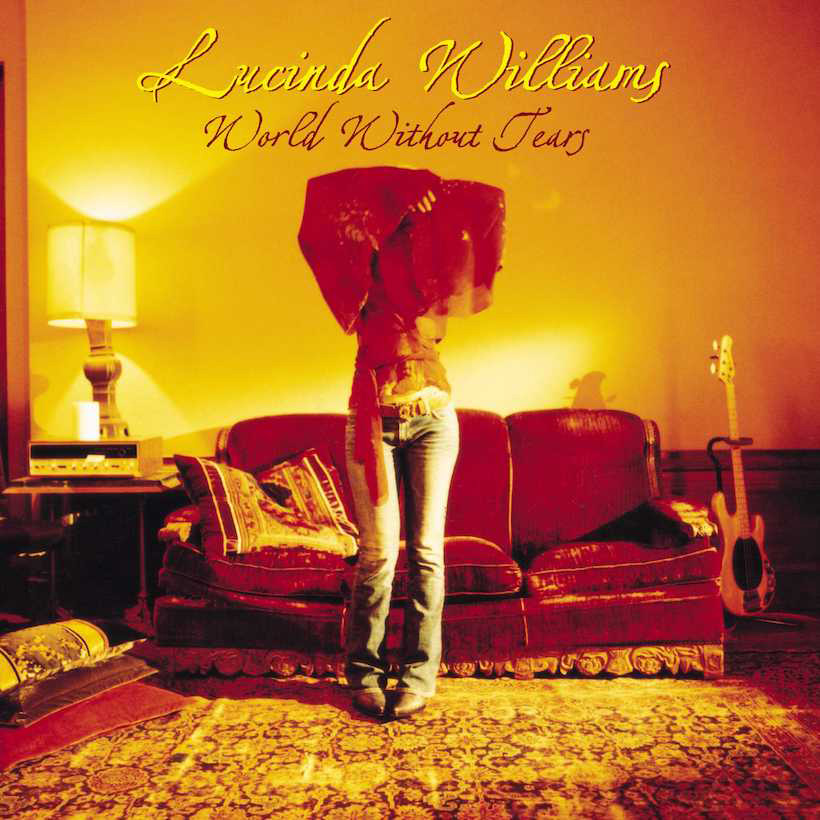They say time heals all wounds, but that maxim has never applied to Lucinda Williams. On her seventh studio album, 2003’s World Without Tears, Williams brings her unique mix of heartache, carnal desire, and strong-willed resolve, and lays it out for all to witness.
Listen to World Without Tears on Apple Music and Spotify.
Not that she’s ever shied away from dark subjects. Williams is a blues singer, after all – that’s reflected in the structure and impassioned delivery of her songs. But one thing is clear: she was mad as hell when she recorded World Without Tears, and she was not going to take it anymore.
Nobody’s martyr
Williams has made a career wearing her pain on her sleeve, but she’s nobody’s martyr. On World Without Tears, she brought the rock’n’roll sensibility of her breakout hit Car Wheels On A Gravel Road and the unflinching introspection of Essence for another intensely personal record that showcases the best of her lyrical ability.
At 50, Williams may have left the world of Nashville behind but the “drunken angels” with a sweet side followed her to Los Angeles, where she settled into the local roots-rock scene. For an artist whose previous albums had been dogged by delays and production shake-ups, Williams took a different approach on World Without Tears, bringing in producer Mark Howard (engineer on U2’s All That You Can’t Leave Behind, Bob Dylan’s Time Out Of Mind, and Emmylou Harris’ Wrecking Ball) and recording what’s essentially a live album in a studio set up within an LA mansion that dates back to the 20s.
The album opener, “Fruits Of My Labor,” languidly unfolds, with a couple of tremolo guitar picks, a low-slung melody, and Williams’ unmistakable drawl. While Essence was lyrically succinct, World Without Tears sees Williams return with a sharp pen in hand, painting poignant vignettes of the heartbroken: “Baby, I remember all the things we did/When we slept together/In the blue behind your eyelids.”
It’s the easiest song on the album to digest, but this meal gets heartier as it goes on. “Fruits Of My Labor” is followed by the scuzzy single “Righteously.” Set to some fiery riffs, Williams takes on masculinity in a direct and powerful way on a song that has more weight to it – though it’s still not as terse a slap to the face as the songs that follow.
A student of the school of hard knocks
Following this appetizer, Williams really digs into her demons – or those of her loved ones – from drug abuse (“Ventura”) to childhood trauma (“Sweet Side”) and failed relationships (“Minneapolis”). There’s no proof that Williams recorded the latter while lying face down in bed during the throes of a depressive attack, but it sure sounds that way. Few are lucky enough to have experienced the sort of pain Williams sings about here: it’s romantic in the darkest sense, yes, but it’s also essential to understanding and appreciating the core of her appeal.
For newcomers to Lucinda’s work, it’s clear she’s inspired by another Williams – Hank, that is, another longtime student of the school of hard knocks. But another influence is also at play on World Without Tears. On “Real Live Bleeding Fingers And Broken Guitar Strings,” Williams has plainly stated the song was inspired by Replacements frontman Paul Westerberg. As she sings “I climbed all the way inside your tragedy/I got behind the majesty,” it feels like a familiar dynamic to Williams, and is one of the most self-aware moments on the record.
Simultaneously celebrating the best parts of masculinity while tearing it down, the song “Overtime” is Williams reconciling with what feels like hundreds of break-ups, thousands of goodbyes, and a handful of ships that passed in the night – and it’s where she turns her razor-like perception towards herself. The song sees her accept what she’s been told are her flaws, yet it’s sung with such confidence that it’s difficult to ignore a certain sense of obstinance.
Raw sensuality
The raw sensuality and graphic lyrics of “Those Three Days” must have floored Williams’ audience when they first heard it. Again, she’d confronted sex, relationships and pain before, but never with such honest, earnest lyrics. It’s no wonder she thought to record the emotional blues anthem “Atonement” directly after it, screaming “Come on!” countless times in a tune that’s packed with rage and a need for restitution. The bass guitar reverberates off the aging walls of the LA mansion.
“American Dream” is a rambling, tragic surge that leads straight to the grave of the red, white, and blue. It also displays the wide range of vocal styles at play on this record. From her trembling warble on “Overtime” to her almost-detached rapping on “American Dream,” Williams channels a different persona with its own vocal cadence for each genre, be it country, blues, or Southern rock.
Despite all the scars and lovers lost, Williams still wouldn’t trade away the pain as she ponders what it would be like on a “World Without Tears,” a lazy waltz that you can clearly envision two barflies swaying along to. Closing track “Words Feel” hints that you may finally get to the bottom of what haunts Williams and drove her to commit these songs to tape. Was it a lost love, after all? Was it a loss of hope in general? Who’s to say?
Released on April 8, 2003, World Without Tears helped bring the blues back onto the charts, reaching No.18 on the Billboard Album Chart and proving sad songs and waltzes will always have a willing audience.




